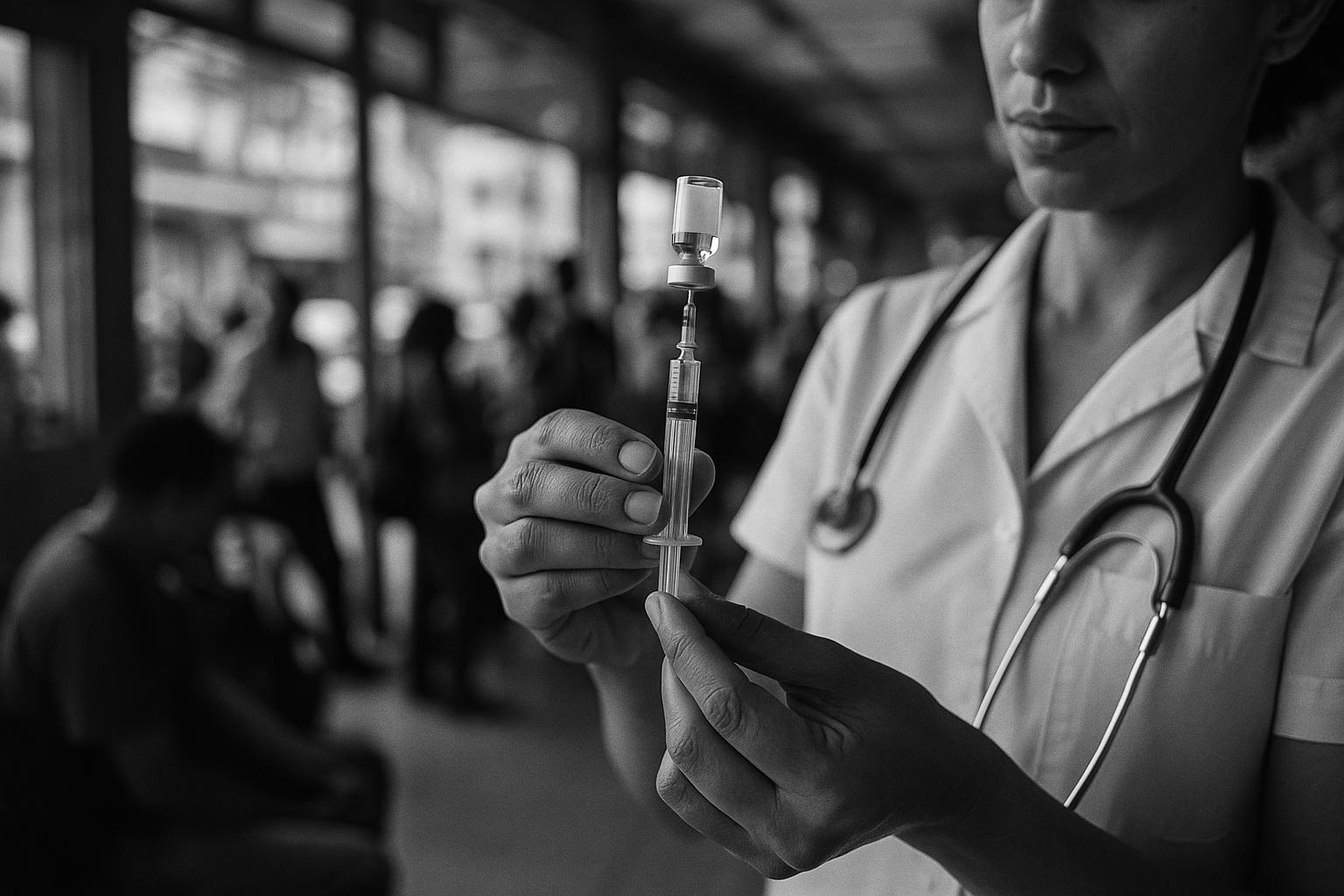Amid rising measles infections concentrated in London and other regions, UK health officials warn parents to vaccinate children urgently this summer to prevent further outbreaks. With vaccination coverage at its lowest in over a decade, the NHS is ramping up campaigns to combat misinformation and protect vulnerable groups ahead of the new school year.
Parents across the UK are being strongly urged to vaccinate their children against measles during the summer holidays, amid growing concerns over a resurgence of cases that could escalate further with increased summer travel. British health officials have reported a notable spike in measles infections this year, with the total reaching 674 cases since the start of January, a figure that has raised alarms particularly in regions such as London and the North West. This resurgence follows last year’s highest annual infection numbers since 2012, underscoring a troubling upward trend in what is widely regarded as one of the world’s most infectious diseases.
Measles, a disease known for causing flu-like symptoms followed by a characteristic rash, can lead to severe complications including hearing loss, meningitis, pneumonia, and even death. Tragically, a child in Liverpool recently died amid severe measles infection combined with other serious health conditions. Health experts highlight that two doses of the measles, mumps, and rubella (MMR) vaccine provide up to 99% protection. Yet, vaccination coverage remains uneven and alarmingly low in parts of England. For instance, areas such as Hackney in East London have seen MMR coverage as low as 60.8% among five-year-olds, substantially below the 83.9% average for England and far from the 95% herd immunity threshold recommended by the World Health Organization (WHO). Similar low vaccination rates are reported in Liverpool, Manchester, and Birmingham.
Public health authorities warn that this patchy immunisation landscape leaves children vulnerable, with the virus capable of spreading to nine out of ten unvaccinated individuals nearby. The UK Health Security Agency (UKHSA) has recorded that nearly half of the cases this year have appeared in London, with 79 cases in Hackney alone, representing over 10% of the national total. Dr Ben Kasstan-Dabush of the London School of Hygiene & Tropical Medicine has described Hackney’s unique population demographics, including a high proportion of young residents, as factors complicating vaccination efforts. Funding inconsistencies and short-term commissioning of vaccination programmes further challenge efforts to significantly improve coverage in such areas.
Experts emphasise that the summer months present a crucial window for parents to update their children’s vaccinations before the school year begins, to shield them from outbreaks. Dr Vanessa Saliba, a UKHSA consultant epidemiologist, underscored that it is never too late for catch-up immunisations, especially as vulnerable groups like infants under one year old and immunocompromised individuals rely on herd immunity to stay protected from serious complications.
The current predicament in the UK mirrors a wider regional and global trend. According to the World Health Organization (WHO) and UNICEF, measles cases in Europe and Central Asia have surged to levels not seen since 1997, more than doubling from approximately 61,000 cases in 2023 to nearly 149,000 in 2024. This alarming rise is linked to a failure to restore vaccination coverage to pre-pandemic levels, with MMR vaccine uptake dropping to around 91%—well below the requisite 95% for herd immunity. Vaccine complacency and misinformation, exacerbated by the absence of recent widespread experience of serious vaccine-preventable diseases, have contributed heavily to this decline. Influential figures such as Robert F. Kennedy Jr., who briefly questioned vaccine safety before endorsing MMR vaccination amid surging US measles cases, have added complexity to public perceptions of vaccine safety.
The UK’s National Health Service (NHS) has responded with campaigns aimed at reversing declining vaccine uptake, which has fallen to a 14-year low for the MMR vaccine, with only about 85% of children in England receiving the required two doses. This figure is significantly under the WHO target and leaves millions of children either unprotected or only partially protected. Health officials are combating persistent misinformation and the lingering impact of discredited claims linking vaccines to autism, a controversy that dramatically reduced uptake in the late 1990s and early 2000s following Andrew Wakefield’s now-debunked study.
Senior health authorities in the UK are calling for urgent government action, particularly increased funding and support for frontline health services like nursing and community vaccination programmes. Flexibility in vaccine appointment options and community outreach are central pillars of the NHS’s strategy to bolster immunisation figures and protect children from preventable diseases. As measles remains highly contagious and potentially deadly, ensuring high vaccine coverage is critical for public health.
Moreover, the issue of booster vaccinations is gaining attention, especially in light of immune amnesia caused by measles, where the virus erases crucial components of immune memory, potentially leaving individuals vulnerable to other infections. Healthcare experts recommend that adults, particularly those vaccinated before 1968 or with compromised immune systems, consider booster doses after verifying their immunity status through accessible testing.
In summary, the UK faces a pressing public health challenge as measles cases rise amid insufficient vaccination coverage. The convergence of regional disparities, misinformation, and post-pandemic complacency demands coordinated efforts between government agencies, healthcare providers, and communities to protect vulnerable populations and prevent further tragedy.
 Reference Map:
Reference Map:
- Paragraph 1 – [1], [4]
- Paragraph 2 – [1], [3], [5]
- Paragraph 3 – [1], [5], [4]
- Paragraph 4 – [1], [3], [4], [5]
- Paragraph 5 – [2], [6]
- Paragraph 6 – [3], [4], [5]
- Paragraph 7 – [1], [7]
- Paragraph 8 – [1], [2], [3], [4], [5], [7]
Source: Noah Wire Services
Verification / Sources
- https://www.dailymail.co.uk/health/article-14962439/Cases-worlds-infectious-disease-UK-measles-london.html?ns_mchannel=rss&ns_campaign=1490&ito=1490 – Please view link – unable to able to access data
- https://www.ft.com/content/bfbc8afc-111d-4975-9381-0fc69ccd7b0f – Measles cases in Europe and Central Asia have surged to their highest levels since 1997, more than doubling from 60,756 in 2023 to 148,974 in 2024, according to the World Health Organization. This alarming increase is attributed to the failure of vaccine coverage to rebound to pre-pandemic levels. The UN children’s agency Unicef warns that widespread vaccine complacency and misinformation are contributing to reduced immunization rates, particularly as current generations have not witnessed the severe impact of vaccine-preventable diseases. Measles, which can cause blindness and organ failure, recently claimed the life of a child in Liverpool, UK. Vaccine hesitancy is also being exacerbated by influential figures such as Robert F. Kennedy, now US Health Secretary, who has publicly questioned the safety of vaccines like the one for whooping cough. Cases of whooping cough in the WHO European region have surged to nearly 300,000 in 2024. The WHO reports that MMR and hepatitis B vaccine coverage has declined to 91%, below the 95% needed for herd immunity, with similar dips in coverage for other key vaccines. Experts urge improved healthcare communication and infrastructure to combat misinformation and restore confidence in vaccines.
- https://apnews.com/article/5c060634a19b8bf272d0f304e9e0f42d – UK health officials are urging parents to vaccinate their children against measles, mumps, and rubella amidst a significant rise in measles cases and the lowest vaccination rates seen in a decade. The National Health Service is launching a campaign following the confirmation of about 250 measles cases in England, primarily affecting children under ten. The MMR vaccine, administered in two doses, has seen a national uptake drop to around 85%, far below the recommended 95% for herd immunity. Over 3.4 million children in the UK are either unprotected or only partially protected due to missed vaccine doses. Measles, although once eradicated in the UK, has re-emerged following outbreaks in Europe and has seen a global increase in cases and deaths, partly due to reduced vaccination rates during the COVID-19 pandemic. Health officials are addressing vaccine misinformation and the lingering impact of discredited claims linking vaccines to autism, emphasizing the importance of accurate information and the necessity of vaccinations to prevent serious health complications.
- https://www.reuters.com/world/uk/britain-seeks-urgent-reversal-fall-childhood-vaccination-rates-2024-02-29/ – Britain is launching a campaign to address the decline in childhood vaccination rates, which have been decreasing over the past decade and worsened after the COVID-19 pandemic. The UK Health Security Agency (UKHSA) cited decreased confidence in vaccines, misinformation, and political polarization during the pandemic as reasons for the exacerbated decline. The campaign will feature advertisements, including a television segment, to remind parents of the importance of vaccines. The push comes amid a surge in measles cases, with reported cases in England rising to 650 since October 1st, and over 180 new cases in the past four weeks. The uptake of the measles, mumps, and rubella (MMR) vaccine remains below the WHO’s target for herd immunity. UKHSA Chief Executive Jenny Harries emphasized the need for an urgent reversal to protect communities and prevent the re-emergence of preventable diseases.
- https://www.ft.com/content/8e8f0cf4-ee19-47e2-872f-4f2e08bba4c6 – A decline in childhood vaccination rates in England has prompted calls from leading health officials for immediate government action to improve frontline health services. Professor Sir Andrew Pollard, chair of the UK’s Joint Committee on Vaccination and Immunisation, emphasized the need for increased funding to support frontline nurses and health visitors. The drop in vaccination rates, highlighted by NHS England data, shows no vaccines meeting the World Health Organization’s 95% coverage target. The measles, mumps, and rubella (MMR) vaccination rate hit a 14-year low, with significant regional disparities, especially in London. Disruption from the Covid-19 pandemic, accessibility issues, and complacency about diseases contribute to the problem. The NHS recently launched a strategy aiming to offer more flexible vaccine appointment options. The Department of Health and Social Care continues efforts to boost vaccine uptake through community initiatives.
- https://apnews.com/article/2f888732cc297090238956986fd89cc4 – In 2024, measles cases surged in Europe and Central Asia to 127,350, double the number from the previous year and the highest since 1997, according to WHO and UNICEF. Romania and Kazakhstan were the hardest hit, with over 30,000 and 28,147 cases respectively. Approximately 40% of infections were in children under 5, and over half of those infected required hospitalization. Measles is highly contagious and preventable with a vaccine that is 97% effective after two doses. However, vaccination rates have declined, particularly in Bosnia and Herzegovina and Montenegro, and need to exceed 95% to prevent outbreaks. The rise in cases follows diminished immunization during the COVID-19 pandemic. Misinformation about vaccine safety continues to hinder vaccination efforts. In the UK, more than 200 cases were reported recently, and the US is also experiencing outbreaks in Texas and New Mexico. Experts stress the importance of vaccination to ensure health security.
- https://www.kiplinger.com/retirement/retirement-planning/do-you-need-a-measles-booster – As of July 2025, the United States has seen a resurgence of measles with 1,288 reported cases—the highest since 1992—despite the virus being declared eradicated in 2000. Measles is not only highly contagious but also poses a significant health risk due to immune amnesia, a condition where the virus erases parts of the immune system’s memory, making individuals vulnerable to diseases they were previously immune to. This phenomenon is particularly dangerous in children and can result in secondary infections or even death. While two doses of the MMR vaccine (measles, mumps, rubella) typically provide 97% protection, some older adults who received earlier or inactivated versions of the vaccine before 1968 may have inadequate immunity. Healthcare experts recommend booster shots for these individuals, those with compromised immune systems, or those without measurable immunity. Immunity can be verified through affordable MMR titer tests, though insurance may not cover them. Fortunately, MMR vaccines are widely available and usually covered by insurance or offered at minimal cost at pharmacies and clinics. People concerned about their immunity are urged to verify their vaccination status and consider a booster to prevent infection and associated complications.
Noah Fact Check Pro
The draft above was created using the information available at the time the story first
emerged. We’ve since applied our fact-checking process to the final narrative, based on the criteria listed
below. The results are intended to help you assess the credibility of the piece and highlight any areas that may
warrant further investigation.
Freshness check
Score: 7
Notes: The data appears recent, citing current figures such as 674 cases since January and 79 cases in Hackney. However, similar reports and historical data from the past 10 months to 1.5 years suggest the narrative has been previously covered. While the inclusion of updated data supports a higher freshness score, the repetition of older material raises concerns about originality.
Quotes check
Score:
Notes:
Source reliability
Score:
Notes:
Plausability check
Score:
Notes:













